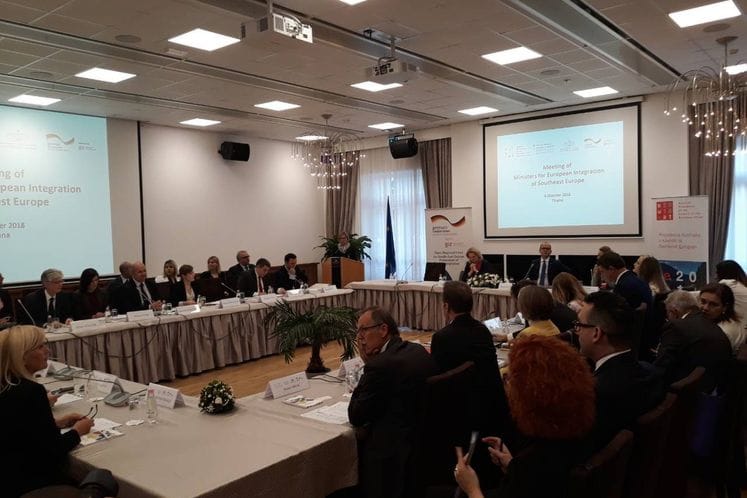- Government of Montenegro
Ministry of European Affairs Drljević in Tirana: Western Balkans expects suppor...
Please note: The page below represents the archived content relating to the previous Government of Montenegro. Some of the information might be inaccurate or outdated.
Archive
Drljević in Tirana: Western Balkans expects support of EU

Published on: Oct 4, 2018 • 6:32 PM Author: KEI
The countries of the Western Balkans have shown strong commitment to the implementation of reforms and expect from the European Union to further support the process of European integration of the region in the coming years, Chief Negotiator Aleksandar Drljević said today in Tirana.
Drljević participated in a meeting of European Affairs Ministers and state officials in charge of European integration in the countries of Southeast Europe.
Drljević pointed out that Montenegro, as the country that has made the most progress in the EU accession process, is happy to share its experience in negotiations with neighbouring countries.
“The countries of the Western Balkans have shown strong commitment to implementing reforms, developing good neighbourly relations and speeding up progress towards the EU. We see that the European perspective really serves as a guarantee for progress in the region. That is why we expect that in the coming years the EU will provide even stronger support to these processes, with the evaluation of individual results on the path towards full membership”, he said.
Recalling the specificity of the negotiations between Montenegro and the EU, Drljević pointed to the fact that Montenegro is the first country to include representatives of the civil sector in the negotiating structure, and that, in line with the new approach in the negotiations, the overall pace of negotiations is based on the progress in Chapters 23 and 24.
The Chief Negotiator assessed that the commitment and determination of the Montenegrin Government and all segments of society, as well as the efficient coordination and organisation of work of the negotiating structure, led to visible results on Montenegro's path towards the EU.
“Montenegro today has a very good legislative framework in most of the negotiating areas, in line with European regulations and standards. We have significantly strengthened our institutions and improved administrative capacities. It is especially important that the effects of reforms are more visible in practice and that they reflect on the everyday life of our citizens. A better standard of living and European quality in all areas is what we are aiming for, and the mechanism that will enable us to achieve this in the most efficient way is the process of European integration and accession negotiations”, Drljević noted.
He emphasised that the countries of the Western Balkans should be mutually supportive, exchange knowledge and lessons learned and help one another in the implementation of demanding reforms. “Through cooperation in the process of EU accession, we are actually preparing for cooperation, which will, from the date of accession to the EU, be developed on a much higher level”, Drljević added.
GENERAL SECRETARIAT OF THE GOVERNMENT OF MONTENEGRO
SECTOR FOR INFORMING THE PUBLIC ABOUT THE EU AND THE EU ACCESSION PROCESS
Drljević participated in a meeting of European Affairs Ministers and state officials in charge of European integration in the countries of Southeast Europe.
Drljević pointed out that Montenegro, as the country that has made the most progress in the EU accession process, is happy to share its experience in negotiations with neighbouring countries.
“The countries of the Western Balkans have shown strong commitment to implementing reforms, developing good neighbourly relations and speeding up progress towards the EU. We see that the European perspective really serves as a guarantee for progress in the region. That is why we expect that in the coming years the EU will provide even stronger support to these processes, with the evaluation of individual results on the path towards full membership”, he said.
Recalling the specificity of the negotiations between Montenegro and the EU, Drljević pointed to the fact that Montenegro is the first country to include representatives of the civil sector in the negotiating structure, and that, in line with the new approach in the negotiations, the overall pace of negotiations is based on the progress in Chapters 23 and 24.
The Chief Negotiator assessed that the commitment and determination of the Montenegrin Government and all segments of society, as well as the efficient coordination and organisation of work of the negotiating structure, led to visible results on Montenegro's path towards the EU.
“Montenegro today has a very good legislative framework in most of the negotiating areas, in line with European regulations and standards. We have significantly strengthened our institutions and improved administrative capacities. It is especially important that the effects of reforms are more visible in practice and that they reflect on the everyday life of our citizens. A better standard of living and European quality in all areas is what we are aiming for, and the mechanism that will enable us to achieve this in the most efficient way is the process of European integration and accession negotiations”, Drljević noted.
He emphasised that the countries of the Western Balkans should be mutually supportive, exchange knowledge and lessons learned and help one another in the implementation of demanding reforms. “Through cooperation in the process of EU accession, we are actually preparing for cooperation, which will, from the date of accession to the EU, be developed on a much higher level”, Drljević added.
GENERAL SECRETARIAT OF THE GOVERNMENT OF MONTENEGRO
SECTOR FOR INFORMING THE PUBLIC ABOUT THE EU AND THE EU ACCESSION PROCESS
Related articles:
Twenty-sixth Newsletter on European integration Dec 29, 2023
Is this page useful?
